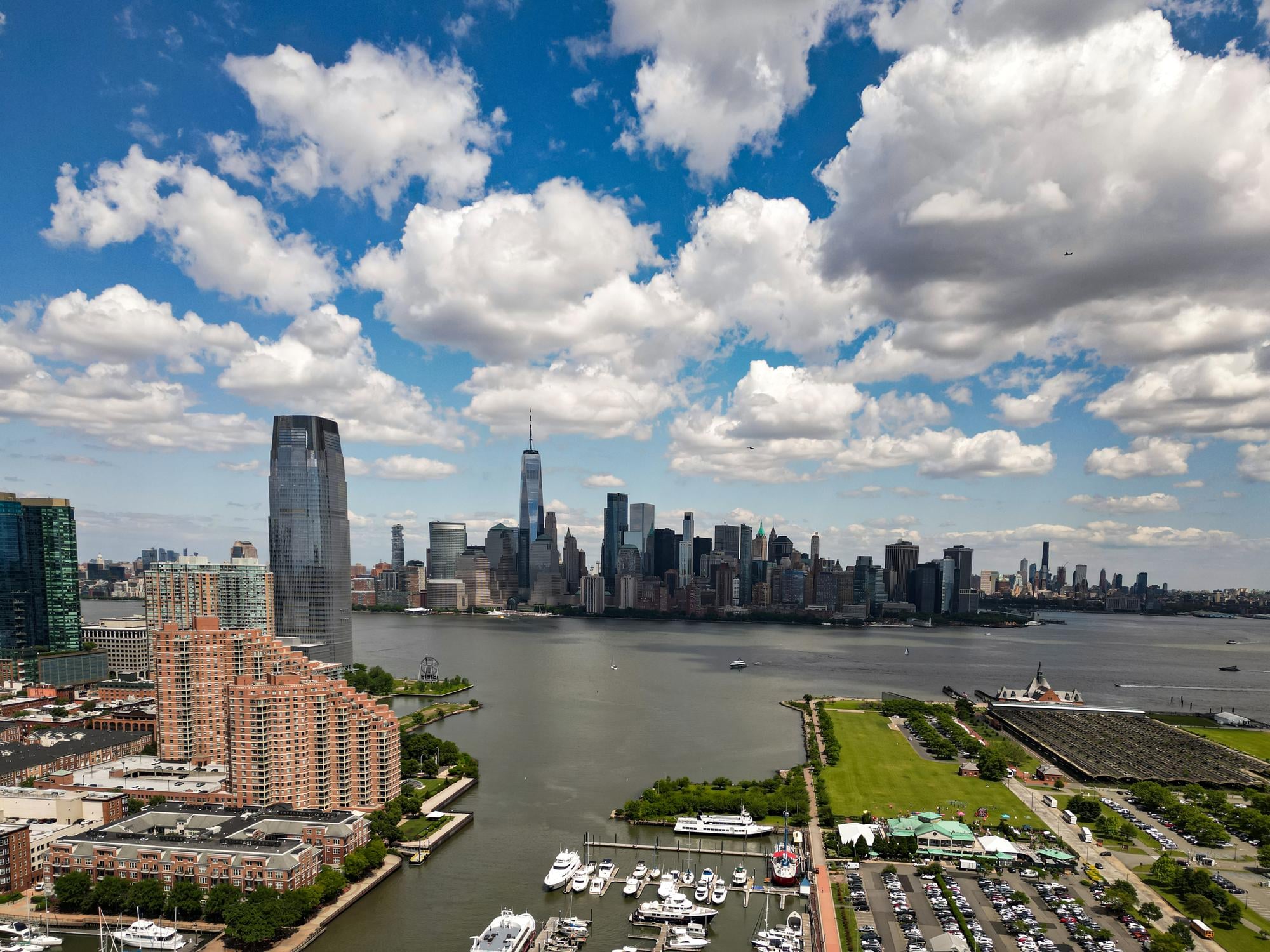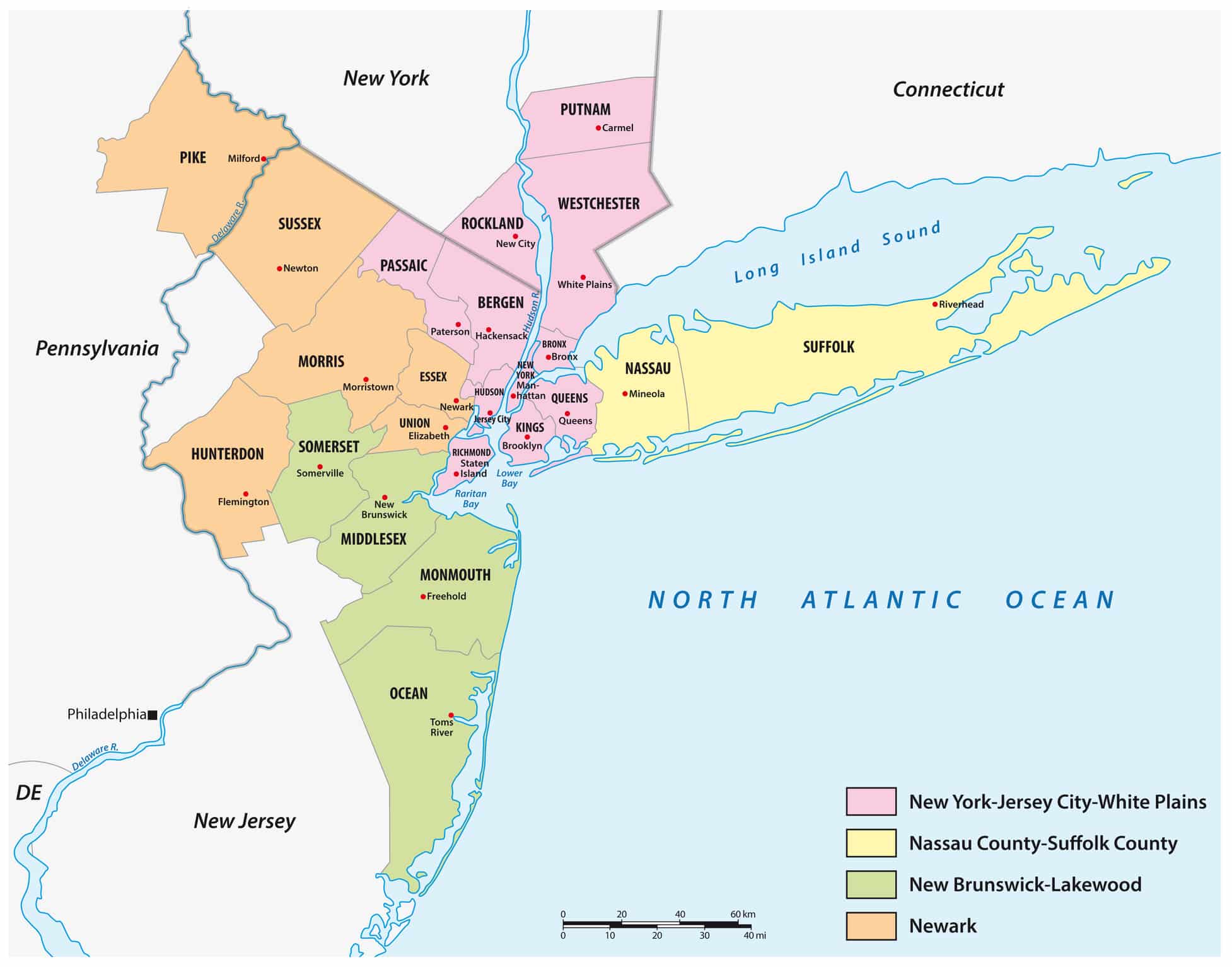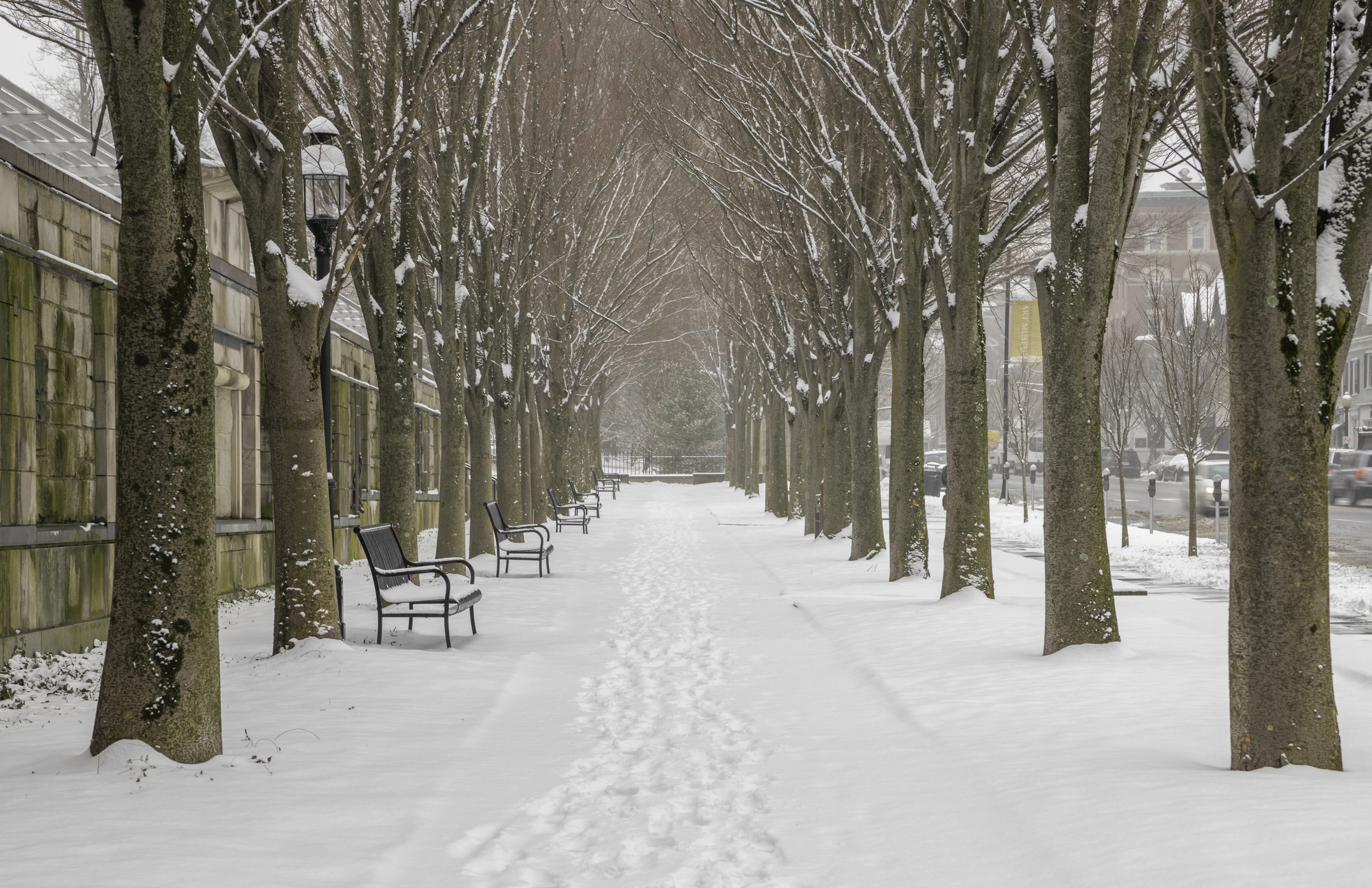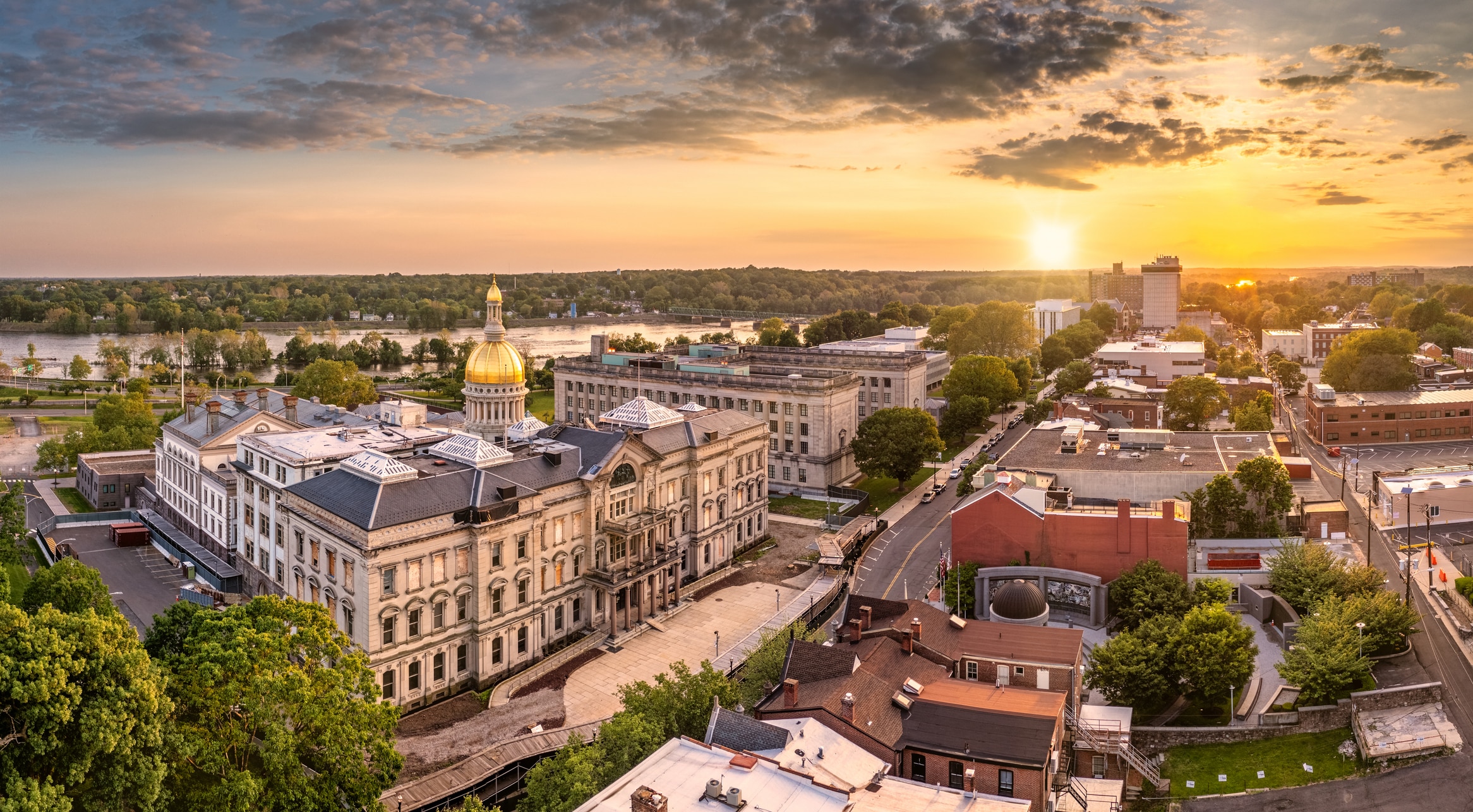If you’re thinking about moving to New Jersey, you probably have questions — about the best cities to live in, the local schools, and the cost of living.
The perks? The Garden State is not only known for its top-notch schools, strong job market, and proximity to major cities like New York. Living in New Jersey also means you have access to the beach, the mountains, and plenty of local entertainment.
But before making any final decisions, you need a comprehensive picture of what life is really like in New Jersey. If you’re seriously considering moving to New Jersey, here are some of the most important things you should know first.
11 Things To Know Before Moving to New Jersey
1. Living in New Jersey puts you in the middle of NE action
One of the major selling points for moving to New Jersey is its proximity to the economic powerhouses of New York and Philadelphia.
For example, New York City is only a short commute from Northern Jersey towns like Jersey City, Hoboken, and Weehawken. On the opposite end, South Jersey towns like Camden, Gloucester City, and Collingswood are only a 15-minute drive from downtown Philadelphia. And even if you don’t work in the city, both metros offer unlimited opportunities for dining and entertainment.

2. It’s called the “Garden State” for a reason
Forget the cities and the dense populations if that’s not your thing. For avid outdoor enthusiasts moving to New Jersey, you’re in luck: the state boasts miles of coastline, lush farmland, beautiful parks, and national forests.
A few standouts include the sprawling Wharton State Forest, rich in both history and nature, and Liberty State Park, where you can see the Statue of Liberty in all her glory. New Jersey is also home to 72 miles of the Appalachian Trail, so whether you’re a hiker, biker, horseback rider, or just someone who likes to get lost on a walk in the woods, there are countless places to explore for those living in New Jersey.
3. The cost of living in New Jersey is higher than average
We won’t beat around the bush: The cost of living in New Jersey is high — 17 percent higher than the national average. Housing, clocking in at 44 percent above the national average, is by far the biggest expense. While moving to New Jersey is a more affordable option compared to big states like New York and California, you’ll still want to research living costs to determine if living in New Jersey is a suitable option for you.
What salary do you need to live in New Jersey? The salary you need to live in New Jersey ultimately hinges on where you settle down and what your personal and household needs are. For instance, the cost of living in New Jersey for a single person might be closer to $55K a year (minimum). But the cost of living in New Jersey for a family of 4? That family will likely need to make between $100K and $200K to live relatively comfortably in the state. |
4. New Jersey’s job market is strong and diverse
On a brighter note, moving to New Jersey could be great for your career. Home to the headquarters of several industry-leading enterprises like Prudential Financial, Merck, Unilever, and Johnson & Johnson, New Jersey has a robust and well-diversified economy that offers higher wages than most other states. The median salary is $83,102, well above the national average.
5. The best places to live in New Jersey depend on the region
New Jersey might be small, but you’d be surprised by how much regional diversity is packed into such a compact state. Here’s a look at some of the best cities to consider when you’re moving to New Jersey, broken down by region:
Northeast New Jersey: This is the landing place of many out-of-state commuters and visitors, especially those who work in NYC. While it’s still urban — home to Hoboken and Jersey City — it’s less congested than New York, and as a result, one of the best places to live in New Jersey for families.
Northwest New Jersey: If you’re looking for more rural living in New Jersey, here you’ll find more scenic routes, sparser subdivisions, and peaceful surroundings. Northwest New Jersey is home to quaint villages like Hackettstown and Sparta.
Central New Jersey: Central living in New Jersey is the best of both worlds, where you can enjoy access to larger cities without the hustle. This part of the state is also steeped in history. It’s home to the state capital, Trenton, and historic universities Princeton and Rutgers, which were founded before the Revolutionary War. Here, consider looking at towns like Edison, Woodbridge Township, and New Brunswick as options for settling down.
South New Jersey: The southern parts of the state include more suburban towns like Cherry Hill and Moorestown, which present a peaceful, small-town vibe while still being accessible to cities like Philly.
| Ready to make the move to New Jersey? Get a fast, free quote from Colonial. |
6. Jersey housing costs are high and getting higher
Unfortunately for buyers, the New Jersey housing market is hot. From 2023 to 2024, the state saw the second-largest percentage increase in home prices across all 50 states, at 8.3 percent.
Keep in mind, though, that average home prices vary widely across the state. The median price for housing in New Jersey is nearly $565K, but the median price could be as low as $220K in Atlantic City or as high as $1.1 million in Montclair.
If you’re looking to rent when moving to New Jersey, note that the average 1-bedroom apartment is $2,085 a month, and an average 2-bedroom is $2,699. But like the housing market, you’ll see a range of rent prices across NJ, from $1,209 a month in Trenton to $3,814 a month in Hoboken.
7. Schools in New Jersey are among the best in the U.S.
High housing costs are partly driven by the value that folks living in New Jersey place on the state’s high-quality public schools, which consistently rank as some of the best in the nation.
Why are Jersey public schools so good? Researchers point to a range of factors, including an excellent student-to-teacher ratio, high levels of excellence in academic performance, and low reported rates of hazing and bullying.
One of the other benefits of living in New Jersey is its excellent universities (Princeton was just ranked number one in the nation for the 15th year in a row) and commitment to promoting higher education. So, even when the kids graduate, there’s a decent chance they’ll choose to attend school close to home.
8. Public transit is a lot better than fighting Jersey traffic
If you’re moving to New Jersey and you have to commute to work in neighboring New York or Philly, you may want to rethink driving.
Infamous highways like the New Jersey Turnpike, Garden State Parkway, and certain stretches of Interstate 295 are the definition of gridlock, depending on the time of day. And if you’re commuting to and from NYC via the Lincoln Tunnel or the George Washington Bridge, expect exceptionally heavy traffic.
Fortunately, New Jersey has plenty of public transit options. In addition to the NJ Transit and PATH Train systems, the state boasts three light rail systems that connect major cities and some rural areas.

9. From freezing winters to humid summers, Jersey weather could be better
Living in New Jersey, you’ll definitely experience the extremes of all four seasons — but you can expect conditions to vary depending on the region. Summers (June through August) are usually sweltering and humid, especially inland, with occasional thunderstorms. The coastal regions, though, provide a pleasant antidote to Jersey summer heat.
Winter brings the holiday season, but also up to 30 inches of snow annually in the north. Average winter temps across the state range from the low 30s to mid-40s. Don’t be surprised if the differences in winter conditions impact how you drive, as certain jurisdictions will require chains or snow tires during specific months.
10. New Jersey taxes pack a heavy punch
There’s no way to sugarcoat it: moving to New Jersey means facing one of the highest tax burdens in the country. Income and property taxes skew high, but keep in mind that how much you pay will depend on your income level, deductions, and where you live. You can use NJ’s tax calculator to estimate how much you may have to dish out.

11. Jersey beaches are legendary
New Jersey boasts some of the most scenic and famously fun beaches on the East Coast, with over 130 miles of coastline. Here are some of the best beaches in the state:
Ocean City is a family-friendly beach with an iconic boardwalk and amusement park vibe.
Asbury Park offers beachgoers a hip, artsy atmosphere, along with legendary waves for the surf crowd.
Long Beach Island is a massive 18-mile-long barrier island with a boardwalk of shops, food, and clubs, as well as options for kayaking and jet skiing.
Cape May is an idyllic, classic beach, perfect for slow days of sunbathing and relaxing. It’s also home to the historic Cape May Lighthouse.
If you’re looking for something more risqué, the Gunnison Beach section of Sandy Hook is a “clothing-optional” location.
Is New Jersey Worth Living In?
Like any state, there are plenty of pros and cons of living in New Jersey, and the best fit depends on your own needs and preferences. Here’s a quick tally.
Pros of Living in New Jersey | Cons of Living in New Jersey |
|
|

You’ll Find Plenty of Fun Things To Do in New Jersey
One of the best parts of living in New Jersey is experiencing its unique flavor and fun. Here are some attractions you’ll only find in the Garden State.
Catch a flick at Delsea Drive-In Theater
New Jersey is the birthplace of the drive-in theater, and you can still visit Delsea Drive-In — the only remaining drive-in theater in the state — located in Vineland. Enjoy classic double features while experiencing a nostalgic piece of American history.
Walk with sharks at the Adventure Aquarium
At the Adventure Aquarium in Camden, you can walk across the Shark Bridge, a unique V-shaped suspension bridge that lets you walk directly over a tank filled with sharks. This is a one-of-a-kind experience you won’t find anywhere else.
Hike Wawayanda Mountain and the Stairway to Heaven
The "Stairway to Heaven" offers stunning views of the New Jersey countryside and is considered one of the best hikes in the state. This is the place to go if you’re around Vernon in Northern Jersey and want a unique, breathtaking hike.
Climb aboard the USS New Jersey
Check out the Battleship New Jersey Museum & Memorial aboard the most decorated battleship in U.S. naval history. Visitors can explore the decks, learn about the ship’s role in World War II, and even participate in overnight tours where they sleep in the sailor bunks.
Camp in the Pinelands
Southern New Jersey is home to 1.1 million acres of forest known as the New Jersey Pine Barrens, or the Pinelands, where you can camp, hike, and canoe in this massive forest. But watch out for the Jersey Devil — it’s said to make the woods its home.
Stroll around Asbury Park
Asbury Park has had a long, historic, and sordid history. It rose as a major destination in the 1920s, but fell on some pretty hard times in the 70s. Now, following years of revitalization, Asbury Park has become an epicenter of live music, shopping, and dining along its historic boardwalk.
Try out all the classic diners
You may not know that New Jersey holds the distinct honor of being the “diner capital of the country,” with hundreds of iconic American institutions open all day. Grab your car and prepare for home-cooked meals, scratch-made pie, and all the coffee you can drink.
Catch the cherry blossoms
If you’re moving to New Jersey in April, take a detour through Newark to catch the blooming of the cherry blossom trees. Within Branch Brook Park, you can see over 5,000 trees as part of the Essex County Cherry Blossom Festival.
Visit the oldest lighthouse in America
If you’re in Northeast New Jersey, you can see the Sandy Hook Lighthouse, the oldest lighthouse in the country, while you’re exploring the area’s miles of natural beaches and forest.

Moving to New Jersey: Your Moving Options
If you decide to take the leap on NJ living, deciding how you want to handle your move should be a top priority. Here are the three common options to consider.:
DIY With a Moving Truck
A do-it-yourself (DIY) move means renting a truck, packing, loading, and driving everything yourself. It’s the cheapest option but usually comes with hidden costs, heavy lifting, and travel stress. While they’re a great option for small households with flexible timelines, DIY moves can be overwhelming for long distances or large homes — so check our moving out of state guide before you get started.
Moving With a Container
Moving with a container is a middle-ground option. The moving company you choose will drop off a large portable moving container at your home, where you’ll load your belongings yourself at your own pace. The moving company will then transport the container for you to its new home, so you don’t have to worry about driving a large truck. This option is usually pricier than DIY moves but cheaper than full‑service movers.
Hiring Full‑Service Movers
With a full-service move, the professionals handle packing, loading, transporting, and unloading your belongings on your behalf. Many companies also offer bonus services, like furniture and unpacking at your new home. While full-service moves are a more expensive option, they can significantly reduce the time and effort you put into the move — not to mention the stress. If you’d prefer a more hands-off move this time around, full-service long-distance moving services are probably the way to go.
Trying to stay organized? Be sure to use our moving checklist to help you stay on top of everything on your plate. |
How Much Does Moving to New Jersey Cost?
You can assume your move will cost a pretty penny, but the total bill will depend on several key factors, like how you move, when you move, and where you’re moving from. To help you calculate moving costs, we’ve provided estimates for popular moving routes to the state:
Moving From California to New Jersey
Californians might choose to move to New Jersey for its lower housing costs, strong public schools, proximity to major East Coast job markets, or a combination of the three. Here’s a general estimate of you can expect to pay, based on where in CA you’re coming from:
Moving Route | Colonial Van Lines |
San Francisco to Newark (North Jersey) | $6,000–$7,000 |
Los Angeles to Edison (Central Jersey) | $6,000–$7,000 |
San Diego to Camden (South Jersey) | $5,000–$6,000 |
*Moving costs for rental trucks and moving containers are rough estimates sourced from MoveBuddha for a 2-bedroom home. Actual moving costs will vary depending on the specifics of your move.
Moving From Florida to New Jersey
Like California, those moving from Florida to New Jersey might be motivated by higher-paying jobs or the highly-ranked public schools. Some Floridians could also be seeking a change of pace, hoping to escape the effects of rapid growth and overcrowding in some parts of their state.
Moving Route | Colonial Van Lines |
Tallahassee to Newark (North Jersey) | $5,000–$6,000 |
Tampa to Edison (Central Jersey) | $5,000–$6,000 |
Miami to Camden (South Jersey) | $5,000–$6,000 |
*Moving costs for rental trucks and moving containers are rough estimates sourced from MoveBuddha for a 2-bedroom home. Actual moving costs will vary depending on the specifics of your move.
Moving From Texas to New Jersey
Those moving from Texas to New Jersey would likely be driven by the same factors as Californians and Floridians. They could also be drawn to a lifestyle change, like a desire to live near the beach or experience all four seasons.
Moving Route | Colonial Van Lines |
Dallas to Newark (North Jersey) | $5,000–$6,000 |
Austin to Edison (Central Jersey) | $5,000–$6,000 |
Houston to Camden (South Jersey) | $5,000–$6,000 |
*Moving costs for rental trucks and moving containers are rough estimates sourced from MoveBuddha for a 2-bedroom home. Actual moving costs will vary depending on the specifics of your move.
Moving to New Jersey With Colonial Van Lines
With high taxes, tricky weather, and major traffic issues, the Garden State doesn’t come without its challenges. But considering the history, culture, excellent public schools, beaches, and proximity to some of the biggest cities in the world — living in New Jersey offers more than meets the eye.
If you’re ready to make the move, let Colonial Van Lines take care of the details. As an interstate moving company with over 50 years of experience under our belt and more than 250,000 moves completed, including moves to New Jersey, our team is well-equipped to ensure a smooth transition to your new home. Contact us for a free moving quote today!

